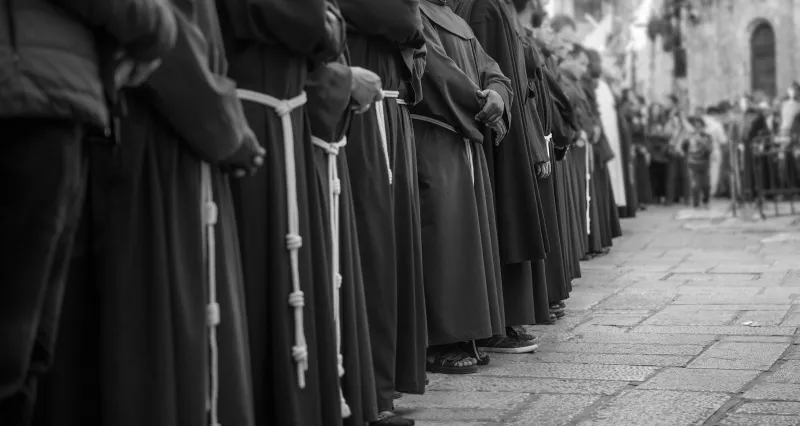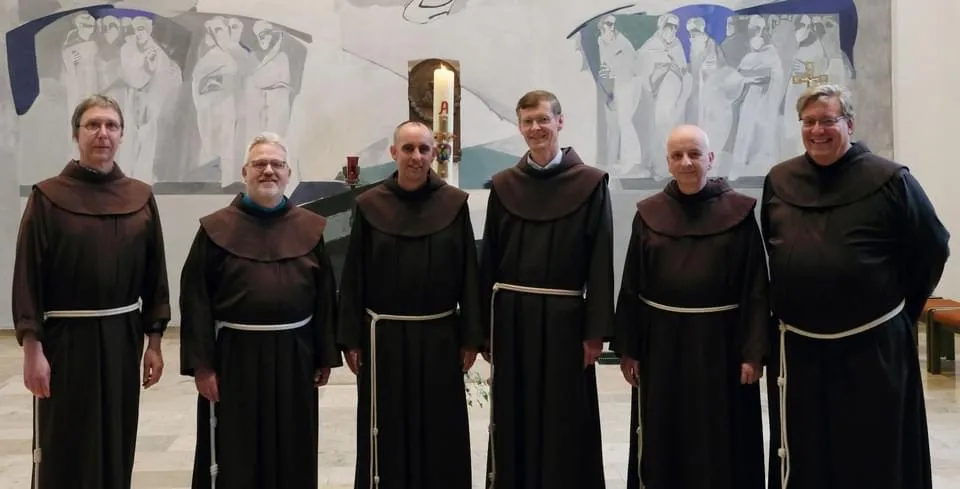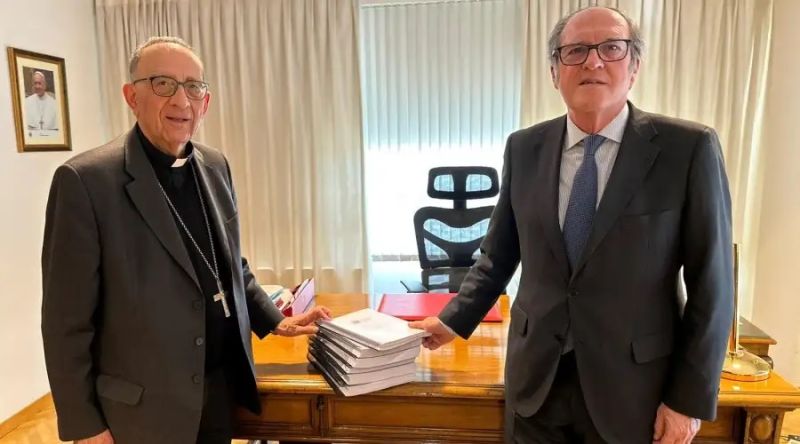
Denver Newsroom, Jun 14, 2022 / 19:15 pm (CNA).
The 300-member Franciscan province of Saint Elisabeth in Germany has elected as its new superior Father Markus Fuhrmann, who a few weeks ago publicly came out as homosexual.
In an interview with MK-Online, the official news website of the Archdiocese of Munich and Freising, Fuhrmann explained why he went public with his homosexuality.
“If I am gay myself, then I want to show that I can also be part of the Church in this ministry. That’s important because it’s not supposed to be like that in the Church. Unfortunately, there is too much institutional hypocrisy in our Church,” he said.
In addition, the new Franciscan superior said that he “personally supports the efforts of the Synodal Way, I am in favor of a critical rethinking of celibacy in the priestly way of life and I am in favor of women having access to ordained ministries.”
The Synodal Way is a controversial multi-year process that began in December 2019 and involves bishops and lay people from Germany to address issues such as the exercise of power, sexual morality, the priesthood, and the role of women in the Church, issues on which they have expressed, publicly and on various occasions, positions contrary to Catholic doctrine.
Asked about the fact that his Franciscan brothers knew of his homosexuality at the time of his election, the new German superior said that “it was very good for me to know that this is very positive for the brothers.”
He added, “I get a lot of encouragement, and maybe that spark of appreciation can spread to other areas of the Church. I think that’s good.”

Fuhrmann was born on August 9, 1971, in Hannover, the capital of Lower Saxony, Germany. He made his simple vows in 1998 and his solemn profession in 2003. He was ordained a priest on May 7, 2005.
In Cologne, part of Saint Elizabeth Province, he ministered to the indigent, and before his election, he served as provincial vicar.
Regarding his future work, the new Franciscan superior in Germany told MK-Online that “a big change is imminent, and I want and must shape it together with the brothers.”
The Church’s teaching on homosexuality
Catholic teaching on homosexuality is summarized in sections 2357, 2358, and 2359 of the Catechism of the Catholic Church.
The Church teaches that homosexuals “must be accepted with respect, compassion, and sensitivity. Every sign of unjust discrimination in their regard should be avoided.”
As the catechism explains, “Tradition has always declared that homosexual acts are intrinsically disordered and this inclination, which is objectively disordered, constitutes for most of them a trial.”
The catechism states, “Basing itself on Sacred Scripture, which presents homosexual acts as acts of grave depravity, tradition has always declared that homosexual acts are intrinsically disordered. They are contrary to the natural law. They close the sexual act to the gift of life. They do not proceed from a genuine affective and sexual complementarity. Under no circumstances can they be approved.”
Providing further guidance, the catechism says, “Homosexual persons are called to chastity. By the virtues of self-mastery that teach them inner freedom, at times by the support of disinterested friendship, by prayer and sacramental grace, they can and should gradually and resolutely approach Christian perfection.”
If you value the news and views Catholic World Report provides, please consider donating to support our efforts. Your contribution will help us continue to make CWR available to all readers worldwide for free, without a subscription. Thank you for your generosity!
Click here for more information on donating to CWR. Click here to sign up for our newsletter.





So the guy who made a vow of chastity is chosen superior because he tells everyone with whom he prefers to have sex. Go figure.
He did not say or admit to engaging in sexual matters. But on the other hand, then why be so open (or even proud) about one’s inclination? I am sure you agree that we are not allowed to judge the soul or position of another because that person may not have been given the same opportunity as we, or may have been born into a difficult situation, raised improperly, traumatized, etc. But neither should the Church promote homosexuality or any sex outside of marriage in any way. ———- I don’t know? I have had it trying to reconcile it all, even worse, observing the USA and the West become so disengaged with God, turn into hedonists and narcissists who make fun of those who champion morality, family, and holiness. It cannot be much longer before severe judgments befall this planet.
Why be so open? He explained why.
This seems to be the same kind of intentional thing that one sees when some Catholics at “Who am I to judge?” and don’t read the context. Also, this is a CWR pickup from CNA. No telling if the whole piece is here. Many media just hit the main paragraphs and keep the rest blog-short.
“Immorality in the Church” – 1 CORINTHIANS 5:12-13 – “After all it is none of my business to judge outsiders. God will juge them. But should you not judge the members of your own fellowship? As the scripture says, “Remove the evil person from your group.” – Reference: Good News Bible GNT
Bravo.
“Immorality in the Church” – 1 CORINTHIANS 5:12-13 – “After all it is none of my business to judge outsiders. God will judge them. But should you not judge the members of your own fellowship? As the scripture says, “Remove the evil person from your group.” – Reference: Good News Bible GNT
Bravo, bravo.
Yes, this is a CWR ‘pickup’ from CNA. (But is that correct editorial lingo?) You are certainly not clever if you cannot tell if CWR has put the ‘whole piece’ here. You may be correct in saying, “Many media just hit the main paragraphs and keep the rest blog-short.” You are definitely not correct to suggest that CWR has here engaged in editing for context according to an ideology. Look at and judge yourself. Be ‘open.’ Good luck.
“No telling if the whole piece is here. Many media just hit the main paragraphs and keep the rest blog-short.”
CWR never shortens or edits CNA pieces, except for the occasional and obvious typological errors.
Yes, he explained why, but it still doesn’t make him fit to be a priest, much less a superior. Plus he’s in favor of women being ordained. What’s scary is he was probably their best choice.
Perhaps that is why he is in favour of redefining celibacy. Mind you most gay clergy consider the celibacy rule not applicable to them.
Always the Germans. Why?
The spirit of Luther and of Hitler? Roger Scruton, British philosopher, wrote an interesting work on guilt and mourning of Germany which it may need to purge or resolve. Without this purgation, worse and more horrid distortions of the common good may manifest. https://www.firstthings.com/article/2022/10/the-work-of-mourning
PSALM 137
v.1:By the rivers of Babylon, there we sat down, yea, we wept, when we remembered Zion.
“If I am gay myself, then I want to show that I can also be part of the Church in this ministry. That’s important because it’s not supposed to be like that in the Church. Unfortunately, there is too much institutional hypocrisy in our Church,” he said.
Interpreting the above, he’s saying that homosexuals are not supposed to be in ordained ministry, but yet he in fact “can” be, and there’s “too much hypocrisy in our Church.” Well, that’s for sure, but his solution is to disfigure the Bride of Christ by redefining Her, because, as with most homosexuals, he’s a narcissist, and so embracing his perverse orientation is far more important to him than embracing his cross.
What Church do you belong to? “Perverse orientation?” There’s nothing perverse about Gods children who have SSA.
I suspect he’s not the only one in that bunch.
See also :
“Fall of Father Dr. Wolfgang Rothe alias ‘Whisky-Vicar’ (…And he fell, and his fall was great – Mt 7,27)”:
https://www.salon24.pl/u/edalward/1290891,the-fall-of-father-dr-wolfgang-rothe
or :
https://gloria.tv/post/LUpCzi9KybgA23DjcZtZGjKNw
… and also see this:
“Counterattack by the Brotherhood of the nine commandments”
https://gloria.tv/post/oTHdAs9PPYuW1LkoVTSwsfjJm
Thank you
I await with anticipatory mirth Peter Beaulieu’s reference to diaper material when his creative urge churns at Furman’s saying: “a big change is imminent, and I want and must shape it together with the brothers.”
As for me and my children, we will play in our new and enclosed sandbox.
Coming out of the hidden closet is passé today. Now they’re bursting out with gusto. “Unfortunately, there is too much institutional hypocrisy in our Church” (Fr Fuhrmann). It appears to indicate more than an attraction to men. If not, then he’s in my prayers to remain chaste. If active I’ll still pray that he converts.
Fr Fuhrmann is not so much the issue in the Catholic Church. Rather it’s the normalization taking place within the ranks. We need acknowledge that the atmosphere for this normalization began to accelerate since 2013. His Holiness and associates, some elevated to ranking positions, are in unison.
Laity are either complacently accepting or devastated. Priests including bishops don’t seem inclined to address it as an issue, most prefer to stick to the Gospels on Sunday. Insofar as the devastated laity they also need understand that this change is occurring informally, meaning that there are no formal, definitive pronouncements to the universal Church – instead they’re informal words, suggestions, either by word, appointments [Hollerich SJ, Card Grech, Fr Martin SJ, Card McElroy, Archbishop Fernandez, on and increasingly on], and restructuring of the Curia.
The trend is spiritually unhealthy. A disease that infiltrates the Mystical Body, symptoms effeminate passivity, lack of commitment to the Gospels. Antidote, reigniting the fire of divine love.
Thinking of St. Francis, our attention is immediately turned to his love for all animals, large and small.
About such animals, take, for example, the two giraffes featured in part of the movie “Gladiator.” Says the gladiator trader before demanding his money back for giraffes that won’t mate, “you sold me queer giraffes!”: https://www.youtube.com/watch?v=NRe_x5CECQg
Now, regarding the Synods, Father Fuhrmann sticks his own neck out, or whatever.
A misunderstood issue among the faithful are the differences in papal teaching, that is, degrees of a binding nature, and as stated in Lumen Gentium 25 requirement to observe with religious reverence. Strictly speaking, that doesn’t mean binding understood as that which must be believed such as the Deposit of Faith left by Christ in the Gospels and the tradition of the Apostles.
For example, Amoris Laetitia falls under the category of observing with reverence, although it is not a formal, binding doctrine. It’s also subject to interpretation. Whereas Humanae Vitae is considered as a binding doctrine on the conjugal act and contraception [Card Ratzinger who wrote the Doctrinal Commentary on Ratio et Fides for John Paul II expressed that opinion] because of its serious wording, its definitive nature, representative of a long history of doctrine within the Church.
Pope Francis’ teaching on the death penalty does not change traditional Catholic doctrine because it doesn’t definitively condemn, it simply says it’s inadmissible. That suggests its admissibility.
Homosexuality has been condemned as intrinsically evil throughout the Bible. When I spoke about ‘commitment to the Gospels’ in my previous comment here, I was referring to the full import of the Gospels and the teaching of the Apostles. Not simply passing over its content absent of an in depth elocution. That in depth articulation with reference to the outstanding issues of the day, abortion, homosexuality is what’s too often missing. Obviously then, we have to get back to preaching as did the Apostles.